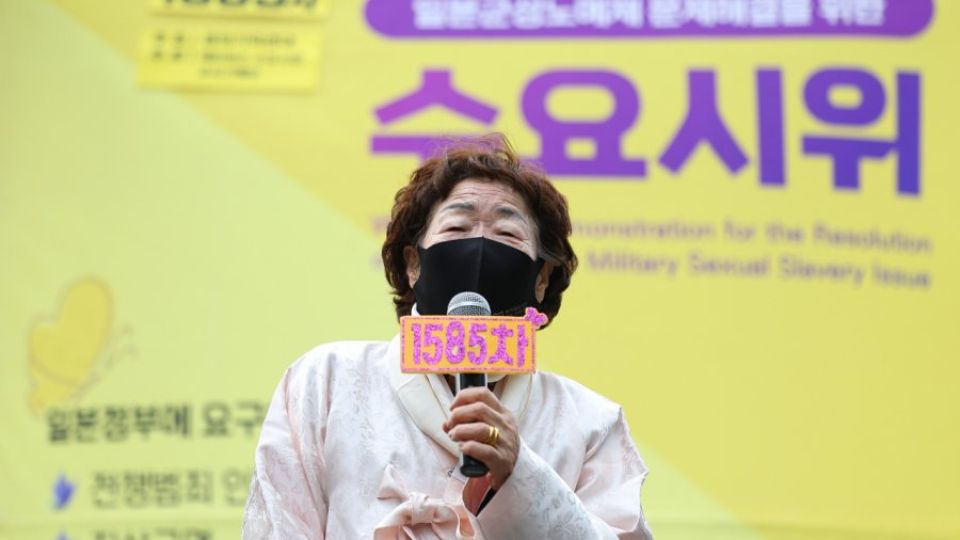March 2, 2023
SEOUL – Soon after President Yoon Suk Yeol gave a key address, calling Japan a partner for South Korea’s regional security and economy, some hundreds held a rally on Independence Movement Day on Wednesday, urging him to keep his promise of resolving historic disputes with the neighboring country including the one over sexual slavery during its 1910-45 rule of Korean Peninsula.
In the late morning chill, around 200 civic activists gathered near the Japanese Embassy in central Seoul, holding paper cutouts of yellow butterflies — a symbol of victims representing a wish to escape from violence and fly — chanting “apologize,” and demanding compensation from Japan.
The protest was a part of the 1,585th weekly rally protesting Japan’s wartime sexual enslavement of Korean women during World War II that has been held for the last 30 years.
Lee Yong-soo, a 93-year-old victim of Japan’s wartime sexual slavery, took over the microphone, said she still has a faith in President Yoon, and demanded his administration to send the matter to the United Nations Committee Against Torture.
“The then-presidential-candidate Yoon Suk Yeol was the third person to visit me, and he said he would resolve the comfort women issue even if he wasn’t elected. His words touched me,” she said. “I don’t think that he lied (at that time), and I will believe in him.”
Watching Lee’s tearful speech, 63-year-old Kim Deok-yeon said he has participated in the demonstration since last year to raise awareness, especially among the younger generation.
“These people were forced to become sex slaves of Japan’s wartime brothels, but Japan seems reluctant (to take responsibility). As a Korean citizen, I couldn’t stand my anger toward Japan for committing such atrocities,” he said, referring to the victims as “survivors of a dark part of history.”
Kim stressed the importance of educating Korean students about undistorted facts in and out of the country, lamenting Japan’s recognition of Dokdo as part of its territory.
“History doesn’t lie — it has everything recorded down. Now is a time to properly educate the younger generation about our country’s past so that the same history will not repeat itself in the future,” he said, hoping young people would create a change.
“Most of the survivors have died. There are only 10 of them left. So what Japan has to do is kneel to show that they are sincerely sorry,” he added.
A student from Germany, who did not wish to disclose her identity, echoed that proper reparations for victims of sexual slavery are needed.
“I was able to closely learn about the issue when I studied at Yonsei University last semester. I was curious about the reconciliation and slavery issue, but it’s disappointing to hear that it remains unresolved (between Korea and Japan).”
“Some Koreans say that Japan should take a cue from Germany in apologizing and paying reparations to its victims, but I think those two matters are a bit different,” she added.
Frustration and anger were also palpable among 30 university students from a comfort women union group based in Chuncheon, who harshly protested for a sincere apology.
“If the government doesn’t respect such historical issues or the voices of victims and protestors, for whom does it exist?” Lee Bada, a 23-year-old student majoring in political science at Kangwon National University, told The Korea Herald.
“Does it exist for Japan or the United States? The government is too biased and fails to take a neutral stance. Then we also don’t need a government that doesn’t stand together with its people and for victims of Japan’s brutal sexual slavery,” Lee added.
Seoul and Tokyo have tried to overcome the rift that has plagued diplomatic ties, but Japan has remained mum for decades. In particular, the so-called “comfort woman statue” — a bronze statue of a seated girl in traditional Korean attire representing victims of Japanese sexual slavery installed outside the Japanese Embassy in Seoul — has been an irritant to the neighboring country.


